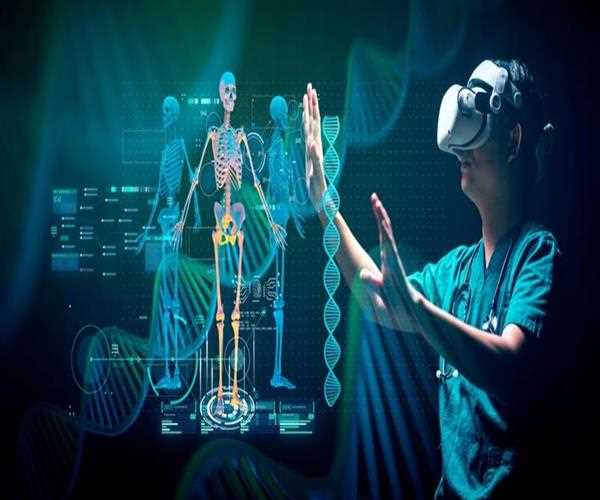
05-Jun-2023 , Updated on 6/5/2023 10:20:50 PM
Why artificial intelligence should be implemented in the healthcare industry
Artificial intelligence (AI) has emerged as a transformative technology in various sectors, and the healthcare industry is no exception. With its ability to analyze vast amounts of data, recognize patterns, and make informed decisions, AI has the potential to revolutionize healthcare delivery, improve patient outcomes, and enhance overall operational efficiency.
In this view, we will explore the reasons why AI should be implemented in the healthcare industry.
Enhanced Medical Diagnostics
Accurate and timely diagnosis is critical in healthcare. AI algorithms can analyze medical images, such as X-rays, CT scans, and MRIs, with exceptional precision and speed. By leveraging machine learning, AI systems can learn from vast datasets and detect subtle abnormalities that may go unnoticed by human experts. This can lead to earlier detection of diseases, improved accuracy in diagnosis, and more effective treatment plans.
Moreover, AI-powered diagnostic tools can reduce human errors, which are inevitable due to factors such as fatigue, cognitive biases, and varying levels of expertise among medical professionals. By providing reliable and consistent diagnostic support, AI can help healthcare providers deliver more accurate and efficient care.
Personalized Treatment Plans
Every patient is unique, and their response to treatment can vary significantly. AI can leverage patient-specific data, including genetic information, medical history, lifestyle factors, and treatment outcomes, to develop personalized treatment plans. Machine learning algorithms can identify relevant patterns and predict the effectiveness of different interventions for individual patients.
By tailoring treatments to specific patient characteristics, AI can improve treatment efficacy, minimize adverse effects, and optimize resource allocation. This personalized approach can enhance patient satisfaction, reduce healthcare costs, and ultimately save lives.
Predictive Analytics and Early Intervention
AI can play a crucial role in predictive analytics, allowing healthcare providers to identify patients at risk of developing certain conditions or experiencing adverse events. By analyzing vast amounts of patient data, including vital signs, laboratory results, and lifestyle factors, AI algorithms can detect subtle patterns and generate risk scores for individual patients.
With this information, healthcare professionals can intervene early, providing preventive measures, lifestyle modifications, or targeted treatments to mitigate potential risks. By leveraging AI's predictive capabilities, healthcare providers can shift from a reactive model to a proactive one, focusing on preventing diseases rather than solely treating them.
Streamlined Administrative Tasks
The healthcare industry is burdened with administrative tasks that are time-consuming and often prone to errors. AI-powered automation can streamline these processes, freeing up healthcare professionals' time to focus on patient care. Tasks such as appointment scheduling, medical billing, and electronic health record management can be automated, reducing administrative costs and improving operational efficiency.
Chatbots and virtual assistants powered by natural language processing (NLP) can provide 24/7 patient support, answering common questions, scheduling appointments, and even triaging medical conditions. This not only enhances patient experience but also reduces the burden on healthcare staff.
Improved Drug Discovery and Development
Developing new drugs is a complex and expensive process that often takes years or even decades. AI can accelerate the drug discovery and development process by analyzing vast amounts of scientific literature, clinical trial data, and genomic information. Machine learning algorithms can identify potential drug targets, simulate drug interactions, and predict the success rate of various compounds.
By narrowing down the options and providing valuable insights, AI can significantly reduce the time and cost involved in bringing new drugs to market. This can lead to faster access to innovative therapies, improved patient outcomes, and more cost-effective healthcare.
The implementation of AI in the healthcare industry holds immense potential to transform patient care, enhance medical diagnostics, optimize treatment plans, enable early interventions, streamline administrative tasks, and expedite drug discovery. While AI should not replace human expertise, it can augment healthcare professionals' capabilities, improving the accuracy and efficiency of healthcare delivery.
The integration of AI into the healthcare industry is not without its challenges. Privacy and security concerns surrounding patient data must be addressed to ensure the ethical and responsible use of AI technologies. Additionally, there is a need for collaboration and standardization to ensure interoperability among different AI systems and healthcare providers.
Despite these challenges, the benefits of implementing AI in healthcare outweigh the risks. AI has the potential to revolutionize the industry, enabling more precise diagnoses, personalized treatment plans, proactive interventions, streamlined administrative processes, and faster drug discovery. By harnessing the power of AI, healthcare providers can improve patient outcomes, enhance operational efficiency, and ultimately save lives.
As AI continues to evolve and mature, it is essential for healthcare professionals, policymakers, and technology developers to work together to harness its full potential. The healthcare industry should embrace AI as a powerful tool that complements human expertise, enabling a more efficient and effective healthcare system.
In conclusion, AI should be implemented in the healthcare industry to unlock its transformative potential. By leveraging AI technologies, healthcare providers can enhance medical diagnostics, personalize treatment plans, enable early interventions, streamline administrative tasks, and expedite drug discovery. The integration of AI in healthcare has the power to revolutionize patient care, improve outcomes, and ultimately shape the future of the industry.

SEO and Content Writer
I am Drishan vig. I used to write blogs, articles, and stories in a way that entices the audience. I assure you that consistency, style, and tone must be met while writing the content. Working with the clients like bfc, varthana, ITC hotels, indusind, mumpa, mollydolly etc. has made me realized that writing content is not enough but doing seo is the first thing for it.
Join Our Newsletter
Subscribe to our newsletter to receive emails about new views posts, releases and updates.
Copyright 2010 - 2026 MindStick Software Pvt. Ltd. All Rights Reserved Privacy Policy | Terms & Conditions | Cookie Policy